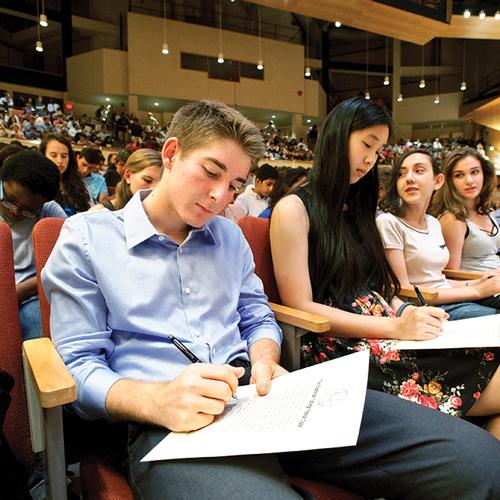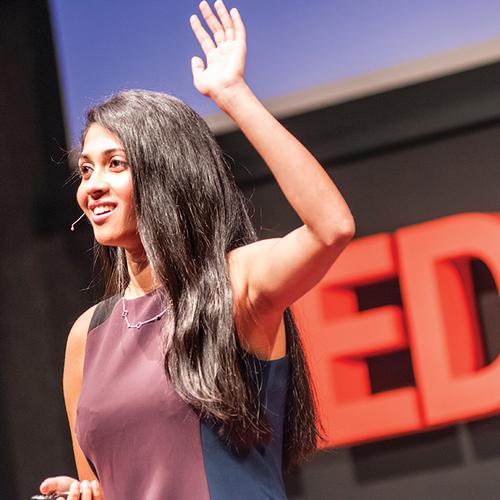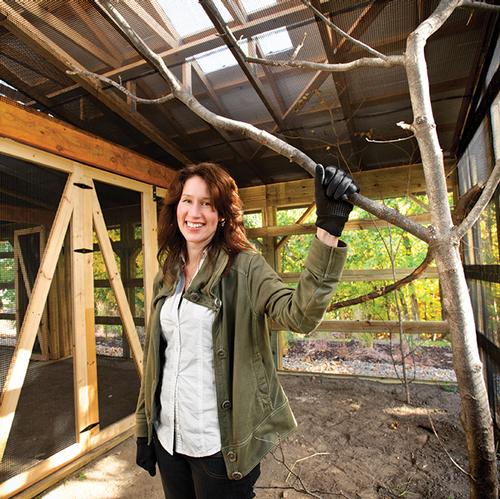Around College
All together now, we pledge our honor

“By my signature below, I affirm on my honor that I will abstain from dishonesty in all academic work,” the Hamilton honor code pledge begins. This fall, for the first time, first-year Hamilton students signed the pledge en masse during Convocation instead of on their own. And instead of the usual form, they signed an elegant letterpress document created by Andrew Rippeon, visiting assistant professor of literature and creative writing, and a group of students during orientation.
The communal signing reflects the Honor Court’s ongoing effort to bring the pledge to the forefront of the student body’s collective conscience, says Taylor Elicegui ’17, court chair. The court, which consists of a student chair, seven students and three faculty members, conducts hearings and makes decisions on alleged honor code violations. By increasing awareness of the code, the court hopes to encourage more students to speak up when they encounter cheating. The pledge requires them to act when that happens.
“We’re hoping that raising awareness will serve as a preventative measure,” says Elicegui, a government major who intends to go to law school. Another court initiative this year: soliciting feedback from professors and encouraging more faculty buy-in to the code. “Sometimes professors will deal with instances of cheating themselves instead of referring it to the court,” Elicegui adds. “This causes problems because students can become repeat offenders without facing the consequences.”
The Honor Court has been working for several years to increase awareness of the honor code among faculty and students, says Tyler Roberts ’12, a former chair of the court who now attends Columbia Law School. He applauds the current court’s efforts to put a spotlight on the code. “The Honor Court is in a unique position to see some of the most common mistakes people make,” he says. “Sharing that information, and raising awareness among students about what is prohibited and what may be different than high school, can help to minimize the number of honor code violations.”
Hamilton’s first TEDx takes on creativity

A group of students — some of whom are now alumni — saw close to a year of work pay off in October when the College held its first TEDx event: a slate of six speakers explored “Creativity and Curiosity Uninhibited.” The event earned rave reviews from students and faculty, says Chidera Onyeoziri ’18, an intended government and history major who was one of the primary organizers.
Among the participants was Sandy Rao ’15, a first-year student at Dartmouth’s Geisel School of Medicine, who advised that “creativity is fostered by patience, revisions and interactions.” Cognitive inhibition, a barrier we use to sort our thoughts and make sure they are relevant to our daily lives, is one process that impedes creativity, claims Rao, because “creativity is not linear.” Providing the examples of JK Rowling, who came up with idea for Harry Potter out of the blue on a train ride, and Theodor Geisel, better known as Dr. Seuss, who wrote Green Eggs and Ham “on a bet that he could not write a story with only 50 words,” Rao emphasized that we all need to find our personal sweet spot between freedom and rules to foster our creativity.
Max Schnidman ’14, an econometrician at the Postal Regulatory Commission, propelled the TEDx conversation from a place of science and social interaction into the realm of numbers and data analysis. He relishes the “sweet satisfaction of statistical analysis” and humorously illustrated the importance of creativity and curiosity in a mathematical context.
The other Hamiltonian in the group was Azriel Grysman, a visiting assistant professor of psychology, who joined director and teaching artist Jeremy Ohringer; Ceasar McDowell, president of the Interaction Institute for Social Change and professor of the practice of community development at the Massachusetts Institute of Technology/Department of Urban Studies and Planning; and Crystal Leigh Endsley, assistant professor of Africana studies at the John Jay College of Criminal Justice in New York City and a former visiting assistant professor in Africana studies at Hamilton.
TEDx is the spawn of TED, the globally popular nonprofit that is, in its own words, “devoted to spreading ideas, usually in the form of short, powerful talks (18 minutes or less).” TEDx is meant to promote ideas and conversation at a local level. Last year a handful of Hamilton students who were active with the Levitt Center’s Social Innovation Lab and Social Innovation Team decided to put together a TEDx event on the Hill. Eren Shultz ’15 and Meghan O’Sullivan ’15 spearheaded the effort. Shultz is now a financial analyst in global product markets with TIAA-CREF, and O’Sullivan is interning with U.S. Rep. Joe Courtney in Washington, D.C.
To come up with the theme, organizers surveyed students and faculty via email. Next they sought nominations for speakers, Onyeoziri says. They received about 60 suggestions, interviewed roughly 30 prospective speakers via Skype and then selected six. TEDx’s strict rules limited the initial audience to 100, but the program was live-streamed and eventually will be available on the TEDx YouTube channel.
With one TEDx event successfully wrapped up, Onyeoziri says the goal is to do a second with a larger audience. “Next year we want it to be all alumni,” she says. O’Sullivan agrees: “We’ve got some good alumni in cool places.”
— Ben Isenberg ’17 and Maddy Maher ’18, contributors
Something to crow about

It’s one thing to study an animal and another to study an animal that appears to be studying you back. That’s one reason why Assistant Professor of Biology Andrea Townsend loves crows. “It’s an interaction. It’s not just you watching them. It’s them watching you as well,” says the ecologist, who tosses peanuts to the crows as she’s leaving her driveway in the morning.
Townsend, who joined the Hamilton faculty in 2014, focuses on disease ecology and behavior in crows. She’s fascinated by cooperatively breeding birds — those that breed together as a family group. Crows are the only cooperatively breeding birds in the Northeast. And what has her especially excited is the opportunity to soon study crows just about eye-to-eye thanks to a new aviary constructed near the Taylor Science Center.
Complete with a heated classroom so work can continue year-round, the aviary will give Townsend and her ecology students a place for study and experiments. “I’m hoping this is going to turn into a series of senior projects. It’s going to be really tractable for them, and there are a ton of experiences, from cooperation to kin recognition. There’s also the extent to which they can recognize individual humans. There’s some evidence that birds that live in urban settings can have the ability to distinguish, say, a threatening human from a nonthreatening human,” she says.
Townsend has secured the state permit she needs to house crows and is in the process of obtaining the necessary federal approval. However, she won’t be capturing crows from the wild, as they would be anxious in an aviary, she says. Instead she’ll gather eggs one at a time, from different nests, to hatch and raise the crows herself. She’s waiting for some sabbatical time to do that. Once the eggs hatch, the chicks need to be fed every 15 minutes roughly between 7 a.m. and midnight, which isn’t compatible with teaching.
Until she’s ready for the crows in a few years, she and her students will capture European starlings from a nearby dairy farm to study in the aviary. Starlings are an invasive species that the state Department of Environmental Conservation allows to be killed or captured if they are a nuisance or damage property, which is the case on the local farm.
Teaching Transitions
Five members of Hamilton’s faculty retired during the last academic year:
Jinnie Garrett, the William R. Kenan Professor of Biology, served on the faculty for 29 years and studies ethical and social issues associated with genetic research. In August, she joined Ferrum College in Virginia as dean of natural sciences and mathematics.
Hong Gang Jin, the William R. Kenan Professor of East Asian Languages and Literatures and founding director of the Associated Colleges in China program, joined the faculty in 1989. Her research focuses on language processing, acquisition and pedagogy. She is currently dean of the Faculty of Arts and Humanities at the University of Macau, China.
Peter Millet, the Litchfield Professor of Physics, has guided students in studies in experimental physics on such varied topics as the interaction between acoustic fields and air jets, and the approach to chaos in a simple mechanical oscillator. He joined the faculty in 1968.
Bob Simon, the Walcott-Bartlett Professor of Philosophy, served on the faculty for 47 years and as head coach of the golf team from 1986 to 2000. The recipient of numerous teaching and professional honors, including the 2010 Distinguished Service Award presented by the Alumni Association, he specializes in philosophical and ethical issues in sport, political philosophy, theories of justice and ethical issues in law.
De Bao Xu, the Leonard C. Ferguson Professor of East Asian Languages and Literatures, joined the faculty in 1995. An expert in theoretical and Chinese linguistics, he is now a distinguished professor at the University of Macau, China.
Nine faculty members have been named to endowed chairs. As described in the Faculty Handbook, appointment to a named chair “is an honor reflecting the special distinction that the holder of the chair brings to the College and his or her profession.”
- Dick Bedient was designated the William R. Kenan Professor of Mathematics.
- Margaret Gentry was named the William R. Kenan, Jr. Professor of Women’s Studies.
- Bonnie Urciuoli was appointed the Leonard C. Ferguson Professor of Anthropology.
- Pat O’Neill was named the Leonard C. Ferguson Professor of Literature and Creative Writing.
- Sam Pellman was designated the James L. Ferguson Professor of Music.
- Professor of Literature and Creative Writing Doran Larson was appointed the Walcott-Bartlett Professor of Ethics and Christian Evidences.
- Ann Silversmith was named the Litchfield Professor of Physics.
- Associate Professor of Biology Wei-Jen Chang was appointed the Sidney Wertimer Professor for Excellence in Advising and Mentorship.
- Brett Hull, head coach of men’s cross country and track & field, was named the Jerome Gottlieb ’64 Coaching Fellow for Exemplary Mentoring.
